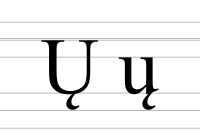Ų
| U with ogonek | |
|---|---|
| Ų ų | |
 | |
| الاستخدام | |
| نظام الكتابة | Latin script |
| النوع | alphabetic |
| لغة المنشأ | Assiniboine Chipewyan Dadibi Dalecarlian Elfdalian Gwichʼin Hän Interslavic Iñapari Ixtlán Zapotec Kaska Lithuanian Sierra Otomi Sekani Tagish Tlingit Tutchone Winnebago |
| Unicode codepoint | U+0172, U+0173 |
| التاريخ | |
| التطور |
|
| مكافئات الترجمة الحرفية | ũ |
| أخرى | |
U with ogonek (majuscule: Ų, minuscule: ų) is a letter of the Latin alphabet formed by addition of the ogonek to the letter U. It is used in Lithuanian,[1] Interslavic, Chipewyan, Dadibi, Dalecarlian, Gwichʼin, Hän, Iñapari, Kaska, Sierra Otomi, Sekani, Tagish, Tlingit, Tutchone, Winnebago, and Ixtlán Zapotec.
Usage
In Lithuanian, it is the 28th letter of the alphabet, and is pronounced as long close back rounded vowel ([uː]). In the past, the letter was used to denote the nasalized close back rounded vowel ([ũ]). Currently, it appears in the words that used to be nasalized in the past, for example in siųsti, which means send.[1]
It is used in Interslavic to denote the etymological presence of a big yus, which evolved into different sounds in Polish and Bulgarian compared to the other Slavic languages. The pronunciation ([o] ~ [ʊ]) depends on the accent of the speaker.[2]
The letter also appears in various Indigenous languages of North America, which are: Chipewyan, Dadibi, Dalecarlian, Gwichʼin, Hän, Iñapari, Kaska, Sierra Otomi, Sekani, Tagish, Tlingit, Tutchone, Winnebago, and Ixtlán Zapotec. In most of them, the letter represent the nasalized close back rounded vowel ([ũ]).
Encoding
| الحرف | Ų | ų | ||
|---|---|---|---|---|
| Unicode name | LATIN CAPITAL LETTER U WITH OGONEK | LATIN SMALL LETTER U WITH OGONEK | ||
| Encodings | decimal | hex | decimal | hex |
| يونيكود | 370 | U+0172 | 371 | U+0173 |
| UTF-8 | 197 178 | C5 B2 | 197 179 | C5 B3 |
| Numeric character reference | Ų | Ų | ų | ų |
References
- ^ أ ب "Wymowa". lietpol.eu (in البولندية).
- ^ "Interslavic language". steen.free.fr/interslavic (in الإنجليزية).